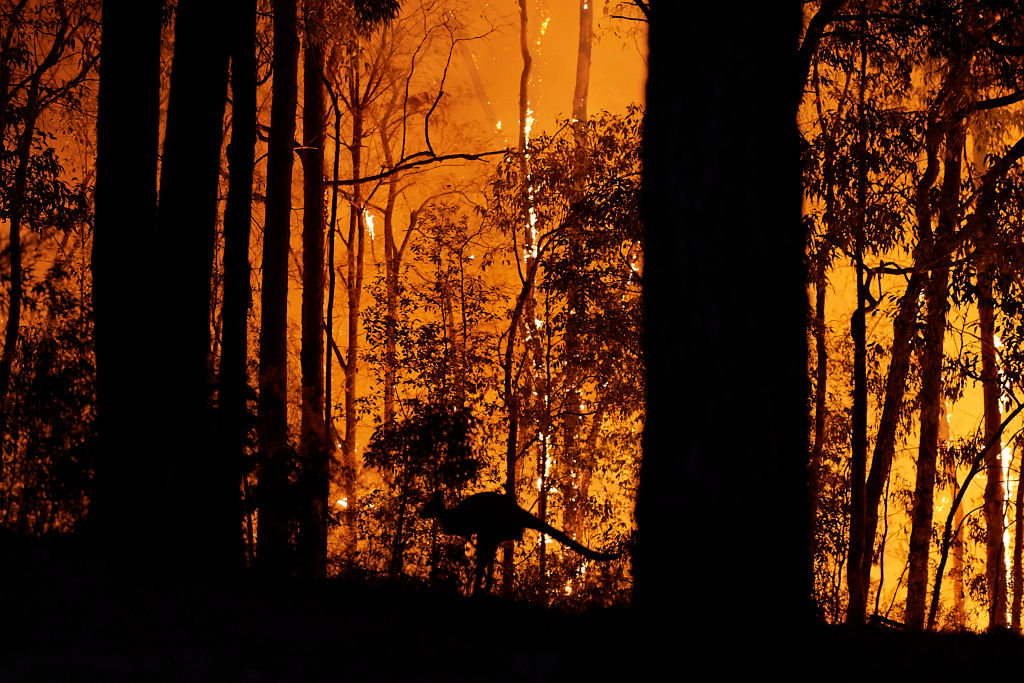
The bushfire royal commission has warned bluntly that Australia must prepare for the dire consequences of climate change with increasingly intense natural disasters, catastrophic fire conditions, more violent cyclones and continued sea-level rise.
Formally titled the
Royal Commission into National Natural Disaster Arrangements and chaired by former Australian Defence Force head Mark Binskin, the investigation into the handling and impact of the devastating Christmas fires makes 80 recommendations to improve Australia’s national natural disaster arrangements and make the nation safer.
The commission says that natural disasters have changed, ‘and it has become clear to us that the nation’s disaster management arrangements must also change’.
‘Extreme weather has already become more frequent and intense because of climate change; further global warming over the next 20 to 30 years is inevitable.’
Australia has warmed by approximately 1.4°C since 1910.
Globally, temperatures will continue to rise, and Australia will have more hot days and fewer cool days. Floods and bushfires are expected to become more frequent and more intense.
The commission says that the 2019–20 fires started in Australia’s hottest and driest year on record. Much of the country that burned had already been impacted by drought and the forest fire danger index was the highest since national records began. It warns that catastrophic fire conditions may render traditional bushfire prediction models and firefighting techniques less effective.
‘Tragically, 33 people died and extensive smoke coverage across much of eastern Australia may have caused many more deaths. Over 3,000 homes were destroyed. Estimates of the national financial impacts are over $10 billion. Nearly three billion animals were killed or displaced and many threatened species and other ecological communities were extensively harmed.’
The commission says it was told by the Bureau of Meteorology that further ‘warming over the next two decades is inevitable’ and that over the next 20 to 30 years, ‘the global climate system is going to continue to warm in response to greenhouse gases that are already in the atmosphere’.
The CSIRO told the commission that some further climate change is locked in ‘because of emissions we’ve already had’.
‘We heard from CSIRO that even under the low emissions scenario, which goes to net negative emissions, the climate does not return to a preindustrial or recent baseline type climate immediately’, the commission says. ‘It takes a very long time for that to occur, and would require CO
2 to be removed from the atmosphere.’
The CSIRO told the commission it was ‘more a matter of stabilising rather than returning’ and Australia ‘need[s] to adapt to further changes in the climate no matter what happens with emissions and we will have inevitable changes in the climate coming through for decades to come, no matter what pathway we take forward’.
The commission says strong adaptation measures are necessary to respond to the impacts of climate change, and warming beyond the next 20 to 30 years is largely dependent on the trajectory of greenhouse gas emissions.
Climate models project a decrease in the total number of tropical cyclones, but an increase in their intensity. ‘However, large natural variability and data limitations make it difficult to be entirely confident about long-term trends in tropical cyclones’, the commission says.
‘Despite this, coastal impacts from tropical cyclones are likely to become worse, due to rising sea levels and increases in cyclone-related extreme rain and wind events.’
In Australia, the latitude at which tropical cyclones reach their maximum lifetime intensity may be shifting southwards. This could have serious consequences for southeastern Queensland and northeastern New South Wales, which are reasonably densely populated areas.
Extreme rainfall events are projected to increase in intensity, potentially resulting in an increase in flood risks. Already, there is evidence that the proportion of total annual rainfall coming from heavy rain days has increased.
By 2090, the Australian sea level is projected to rise by between 26 and 82 centimetres depending on the level of emissions and how relevant systems respond. A greater sea-level rise is possible if ice sheets melt faster than projected.
‘The consequences of sea level rise for Australia will include the flooding of low lying coastal and tidal areas with increased regularity. It is also likely to result in coastal erosion, loss of beaches and higher storm surges that will affect coastal communities, infrastructure, industries and the environment.’
In his forward to the report, Air Chief Marshal Binskin says that achieving an effective national approach to natural disasters requires a clear, robust and accountable system capable of both providing a comprehensive understanding of and responding to the aggregated risks associated with mitigation, preparation for, response to and recovery from natural disasters.
Such a system must have unbroken linkages in place from the highest levels of government to individuals in the community; provide decision-makers with timely, consistent and accurate information; be structured for decisions to be made at the most appropriate level; allow decision-makers to understand and mitigate all risks so far as reasonably practicable; enable stakeholders to understand the residual risk and inform others so that they may take appropriate actions; and must be resourced to fulfil these functions.
‘We were pleased that many stakeholders, including the Australian, state and territory governments, supported, at least in principle, improvements to national natural disaster arrangements.
‘Of course, support is one thing—action is another. The national natural disaster arrangements Australians deserve require unity, not just of commitment or purpose, but of action. Only then can Australians have confidence that the arrangements are the best they can be. The time to act to improve arrangements is now. Unprecedented is not a reason to be unprepared. We need to be prepared for the future.’
 Print This Post
Print This Post